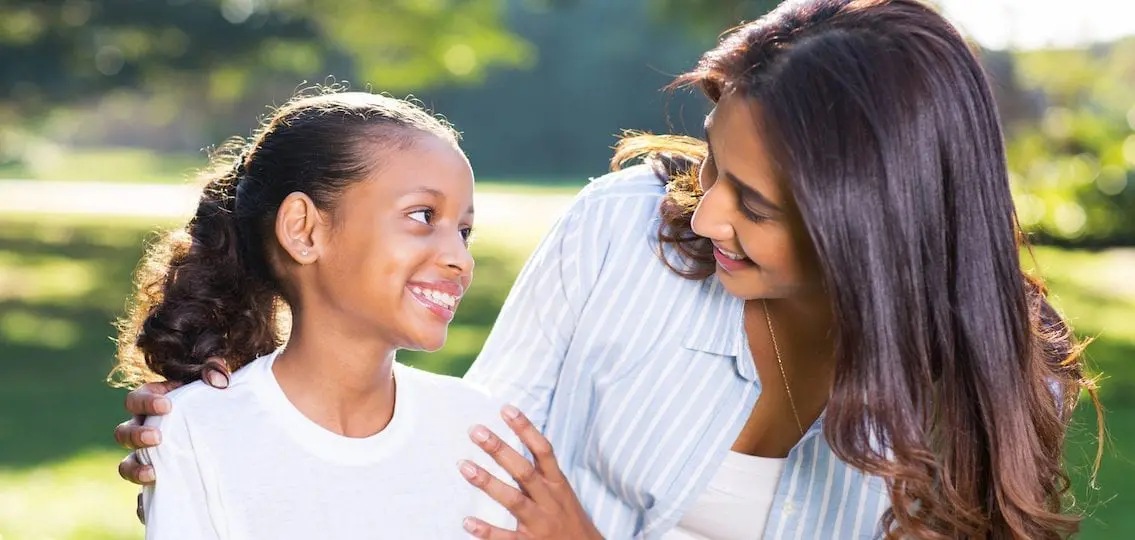Times have changed a bit since our mothers had to explain our periods to us. In my case, I recall asking my mom about a TV commercial for feminine hygiene products. Her response? “I’ll tell you about that later.” When it came time for my daughter to ask me, I made sure to address it right way. Still, it’s not an easy conversation to have, and it can be tricky to know when the right time is to have it.
Preparing For Your Daughter’s First Period
Puberty educator Julie Metzger says most girls (and their parents) are surprised on the day their first period arrives. There’s no magic indicator saying, “Tomorrow will be the day!” so it pays to be prepared. Metzger’s advice is for parents to get out in front of the issue by having several conversations about puberty with their daughters, not just one and done.
“It can’t be just the one book or the one class or the one talk,” says Metzger, R.N., M.N., whose Great Conversations puberty classes have been a rite of passage for girls and their moms for 20 years in the Seattle area. “Your child is changing in front of you and she needs to hear the facts from you again and again.”
Repeated conversations are necessary. Our children are constantly hearing and absorbing information and checking it against what they already know, says Metzger. Before her first period arrives, here’s how to talk with your daughter about what to expect.
When to Talk About Periods
Maria Molland, CEO of THINX, knows a lot about how parents talk with their daughters about their period. Her company makes absorbent underwear that can be worn during menstruation as either a replacement or backup for traditional period products.
In gearing up for the launch of THINX(BTWN), a product designed specifically for tweens and teens, “what we learned is that often parents and schools were linking period discussions to sex education,” says Molland. This can make the whole topic a bit overwhelming.
Her suggestion? “Since periods begin as early as age nine, with the average onset at age 12, parents should realize it’s okay to start with a conversation centered specifically around puberty and periods and build up to the sex talk at a later time,” says Molland.
She also recommends, “Make the conversation as honest and factual as possible, but also make sure you are personable and approachable. Make it an open dialogue that allows for questions and conversation.”
How to Have the Conversation
But how do we launch into these talks? Metzger suggests taking advantage of your time together in the car or while watching TV to initiate the conversation. (Sometimes the lack of direct eye contact eases the tension.)
“Casually say on the drive home from school, ‘Gosh, you’ve really grown taller. That means we’re in the land of puberty,’” says Metzger. The puberty timeframe for girls is shorter than it is for boys. Often a girl’s puberty is complete by the end of middle school or within the first few years of high school.
“Acknowledge their changing body, noting that you see this as normal and exciting. Let them know puberty is a stepping stone to having an adult body with the capacity to have children,” says Metzger.
Talk About Logistics
“I like to tell girls that having your period is more about logistics and being prepared,” says Metzger. I say, ‘Right now there are women in combat, women on sailboats and women in labs doing scientific research while having their periods. J.K. Rowling wrote her books, and Taylor Swift and Beyoncé perform while having their periods,’” says Metzger.
“It’s important they know that their period is nothing to be ashamed of and that it is a normal part of life,” says Molland. “We designed THINX (BTWN) to fit the lives of active girls. It can be worn alone or as a backup depending on lifestyle or personal preference.”
Share Your Story
No matter how scientific you keep it, there is of course an emotional side to this new development for girls. “When moms share their stories of their first period, they make time for their daughter to talk about the heartfelt, emotional side of puberty,” says Molland.
You might recall feeling a little more grown up when you first got your period. Or a time your period came unexpectedly and you had to borrow a sweatshirt from a friend to tie around your waist.
Says Molland, “Our stories make this new experience relatable. After we share stories of what our first few periods were like, we can relay that having our period is easier now thanks to years of experience.”




